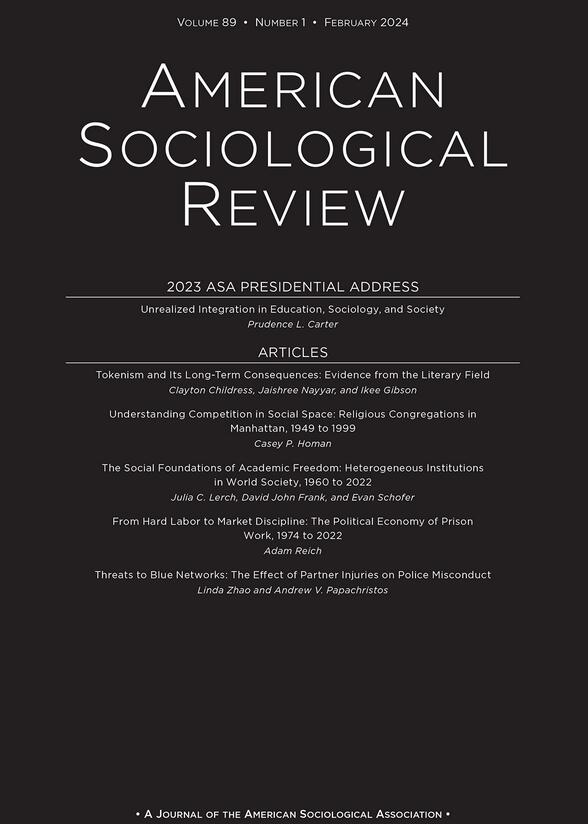Relational Risk: How Relationships Shape Personal Assessments of Risk and Mitigation
IF 6.2
1区 社会学
Q1 SOCIOLOGY
引用次数: 0
Abstract
Objects of risk mitigation are typically viewed as neutral items that limit exposure to an established hazard. However, people may refuse to adopt such tools, even when they feel vulnerable. This article explores how people assess their personal risk and mitigation options by examining PrEP use for HIV prevention. Drawing on semi-structured in-depth interviews with 40 Black and Latino gay, bisexual, and queer men, I argue PrEP uptake is a socially contextualized decision influenced by relational concerns. I develop the concept of relational inoculation, wherein individuals enact a sense of protection against harm through relational work. As individuals consider PrEP, they also contemplate how it may bolster or undermine intimacy they value for reducing interpersonal HIV exposure, as well as dispelling stigmatized notions of riskiness held by their intersecting ethno-racial and sexual minority communities. I develop testable propositions about how respondents’ HIV risk assessments and PrEP use are enmeshed in a societal context of surveillance, in ongoing relations with intimate partners and socially significant others, and in navigation of community belonging within this milieu of risk. This article contributes to sociological research at the nexus of race, sexuality, and health, and offers health policy insight.关系风险:关系如何影响个人风险评估和缓解
风险缓解的对象通常被视为限制暴露于既定危险的中性项目。然而,人们可能会拒绝采用这种工具,即使他们感到脆弱。本文探讨了人们如何通过检查PrEP用于HIV预防来评估他们的个人风险和缓解选择。根据对40名黑人和拉丁裔同性恋、双性恋和酷儿男性的半结构化深入采访,我认为PrEP的接受是一个受关系问题影响的社会背景决定。我提出了关系接种的概念,即个人通过关系工作建立一种免受伤害的保护感。当个人考虑PrEP时,他们也在思考它可能会如何加强或破坏他们珍视的亲密关系,以减少人际间的艾滋病毒暴露,并消除他们交叉的民族、种族和性少数群体所持有的污名化的风险观念。我提出了可测试的命题,说明受访者的艾滋病毒风险评估和PrEP使用如何融入监测的社会背景、与亲密伴侣和社会重要他人的持续关系,以及在这种风险环境中的社区归属导航。这篇文章有助于对种族、性和健康关系的社会学研究,并提供卫生政策见解。
本文章由计算机程序翻译,如有差异,请以英文原文为准。
求助全文
约1分钟内获得全文
求助全文
来源期刊

American Sociological Review
SOCIOLOGY-
CiteScore
13.30
自引率
3.30%
发文量
35
期刊介绍:
The American Sociological Association (ASA) is a non-profit membership association established in 1905. Its mission is to advance sociology as a scientific discipline and profession that serves the public good. ASA is comprised of approximately 12,000 members including faculty members, researchers, practitioners, and students in the field of sociology. Roughly 20% of the members work in government, business, or non-profit organizations.
One of ASA's primary endeavors is the publication and dissemination of important sociological research. To this end, they founded the American Sociological Review (ASR) in 1936. ASR is the flagship journal of the association and publishes original works that are of general interest and contribute to the advancement of sociology. The journal seeks to publish new theoretical developments, research results that enhance our understanding of fundamental social processes, and significant methodological innovations. ASR welcomes submissions from all areas of sociology, placing an emphasis on exceptional quality.
Aside from ASR, ASA also publishes 14 professional journals and magazines. Additionally, they organize an annual meeting that attracts over 6,000 participants. ASA's membership consists of scholars, professionals, and students dedicated to the study and application of sociology in various domains of society.
 求助内容:
求助内容: 应助结果提醒方式:
应助结果提醒方式:


